Reiki healing is an effective practice for achieving energy balance and reducing stress. It promotes relaxation, alleviates anxiety, and enhances overall well-being. Various techniques and misconceptions about Reiki are explored, along with practical ways to integrate Reiki into daily routines for optimal benefits. Additionally, the article highlights rare advantages such as intuitive clarity and emotional release that can further support personal growth.
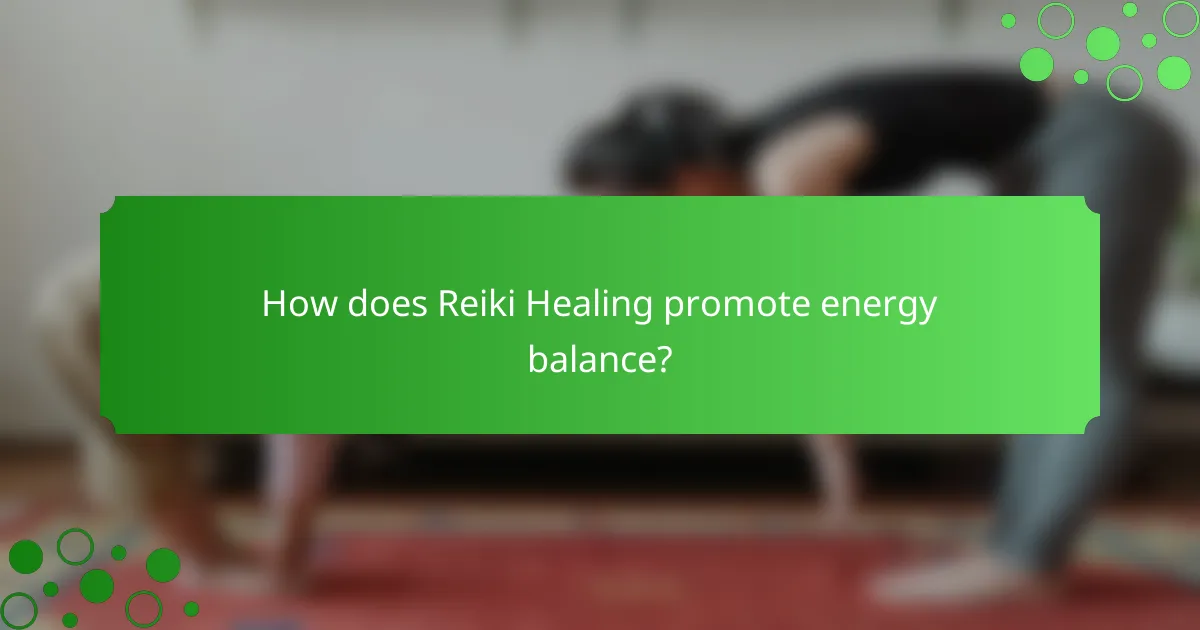
How does Reiki Healing promote energy balance?
Reiki healing promotes energy balance by facilitating the flow of life force energy throughout the body. This practice reduces stress by calming the mind and enhancing relaxation. Reiki sessions often lead to a deep sense of peace, which can help alleviate anxiety and emotional tension. By restoring energy balance, Reiki supports overall well-being and can improve physical health. Many practitioners report increased clarity and focus following a session, highlighting its unique ability to harmonize body and mind.
What are the fundamental principles of Reiki Healing?
Reiki healing focuses on energy balance and stress reduction through several fundamental principles. These principles include the belief in universal life energy, the importance of intention in healing, and the practice of hand placements for channeling energy. Practitioners aim to create a calm environment, fostering relaxation and emotional release. This holistic approach promotes overall well-being, enhancing physical, emotional, and spiritual health.
How does energy flow impact physical and emotional health?
Energy flow significantly influences both physical and emotional health through the principles of Reiki healing. Reiki promotes energy balance, which helps alleviate stress and enhances overall well-being. By channeling healing energy, Reiki practitioners facilitate the release of blocked energy, leading to improved physical health and emotional clarity. Studies indicate that individuals who engage in Reiki report lower anxiety levels and enhanced mood. This holistic approach addresses root attributes of health, emphasizing the interconnectedness of mind and body. Regular Reiki sessions can serve as a valuable tool for maintaining emotional stability and physical vitality.
What techniques are used in Reiki sessions for energy balance?
Reiki sessions utilize techniques such as hand placements, visualization, and breathing exercises to promote energy balance. Practitioners often use light touch or hover their hands above the body to facilitate energy flow. Visualization techniques help clients focus on healing and relaxation. Breathing exercises enhance the overall experience, encouraging deeper relaxation and stress reduction. Each technique aims to harmonize the body’s energy, fostering a sense of well-being.
Which tools enhance the effectiveness of Reiki Healing?
Various tools can enhance the effectiveness of Reiki healing. Crystals, essential oils, and sound therapy are popular options that support energy balance and stress reduction.
Crystals like amethyst and clear quartz can amplify healing energy. Essential oils such as lavender and frankincense promote relaxation and emotional release. Sound therapy, through singing bowls or tuning forks, can create vibrations that deepen the healing experience.
Using these tools can create a more holistic Reiki session, addressing both physical and emotional well-being.
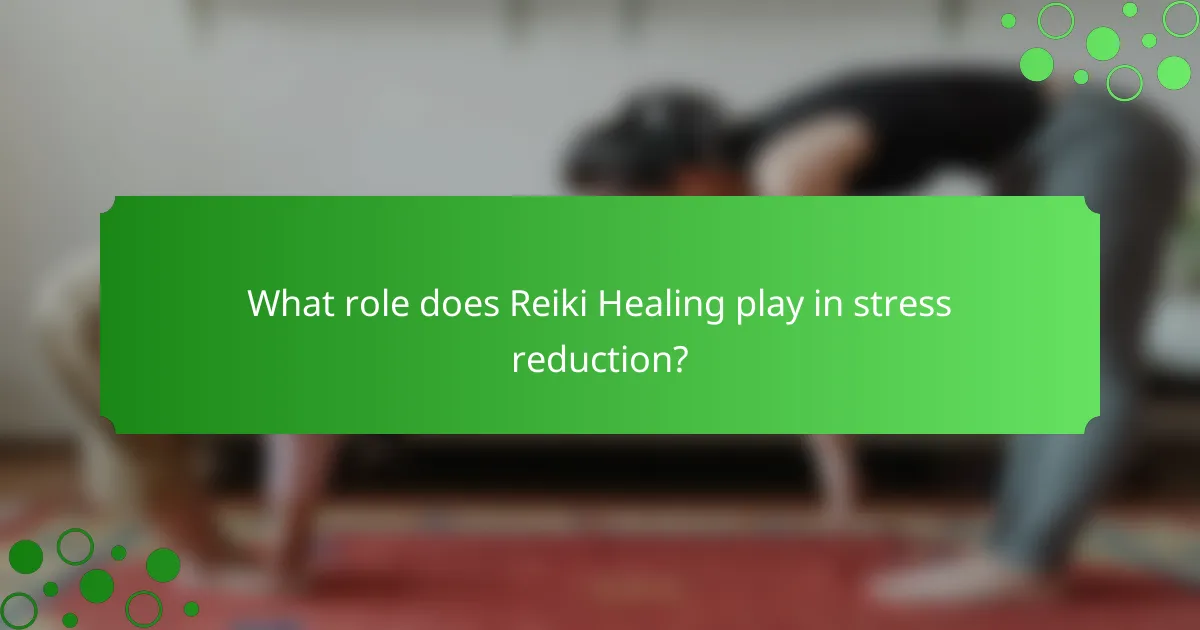
What role does Reiki Healing play in stress reduction?
Reiki healing significantly aids in stress reduction by promoting energy balance and relaxation. This practice encourages a state of calm, which can lower cortisol levels and enhance overall well-being. Research indicates that Reiki sessions can decrease anxiety and improve mood, making it a valuable tool for managing stress. Additionally, the gentle touch and intention behind Reiki foster a sense of safety and support, further contributing to stress relief.
How does Reiki address the psychological aspects of stress?
Reiki effectively addresses psychological aspects of stress by promoting relaxation and emotional release. The practice enhances energy flow, which can alleviate anxiety and tension. By fostering a sense of peace, Reiki helps individuals manage stress responses more effectively. This holistic approach supports mental clarity, enabling better coping mechanisms. Studies indicate that Reiki can lower cortisol levels, contributing to reduced stress and improved overall well-being.
What evidence supports the effectiveness of Reiki for stress relief?
Research indicates that Reiki is effective for stress relief through its ability to promote relaxation and balance energy. Studies show that individuals receiving Reiki report reduced anxiety and improved emotional well-being. For example, a study published in the Journal of Alternative and Complementary Medicine found that participants experienced significant decreases in stress levels after Reiki sessions. Additionally, another research highlighted that Reiki can lower cortisol levels, a key stress hormone. These findings support Reiki as a complementary approach for managing stress and enhancing overall wellness.
Which populations benefit most from Reiki Healing for stress reduction?
Individuals experiencing high levels of stress, chronic illness, or emotional trauma benefit most from Reiki healing. Populations such as healthcare workers, caregivers, and those with anxiety or depression find significant relief through this practice. Reiki promotes relaxation and energy balance, making it effective for stress reduction across various demographics. Studies indicate that regular sessions can lead to improved mental clarity and emotional stability.
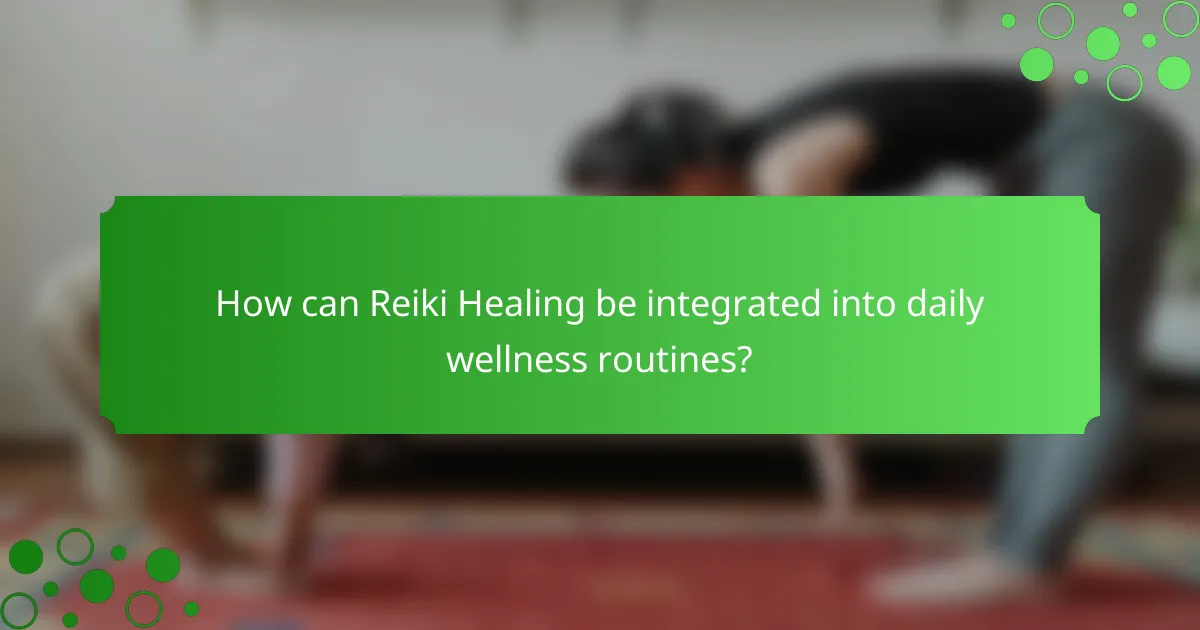
How can Reiki Healing be integrated into daily wellness routines?
Reiki healing can be seamlessly integrated into daily wellness routines through simple practices. Incorporating short sessions of Reiki meditation can promote energy balance and reduce stress throughout the day.
1. Start each morning with a 10-minute Reiki meditation to set a positive tone.
2. Use Reiki techniques during breaks to alleviate stress and recharge energy.
3. End the day with a self-Reiki session to promote relaxation and better sleep.
4. Incorporate Reiki principles into yoga or stretching routines for enhanced benefits.
These practices can enhance overall well-being and foster a deeper connection to self-care.
What are practical ways to practice self-Reiki at home?
To practice self-Reiki at home, create a calm space, set intentions, and use hand positions on your body. Focus on breathing and visualize energy flow. You can incorporate crystals and essential oils for enhanced relaxation. Regular practice promotes energy balance and stress reduction.
How can mindfulness enhance the benefits of Reiki Healing?
Mindfulness significantly enhances the benefits of Reiki healing by promoting deeper relaxation and awareness. Practicing mindfulness during a Reiki session allows individuals to connect more profoundly with their energy flow. This heightened awareness can facilitate stress reduction and emotional release, maximizing the healing experience. Mindfulness also helps in grounding energy, making the benefits of Reiki more pronounced, such as improved emotional clarity and physical well-being. As a result, integrating mindfulness into Reiki practices can lead to more effective energy balance and overall healing.
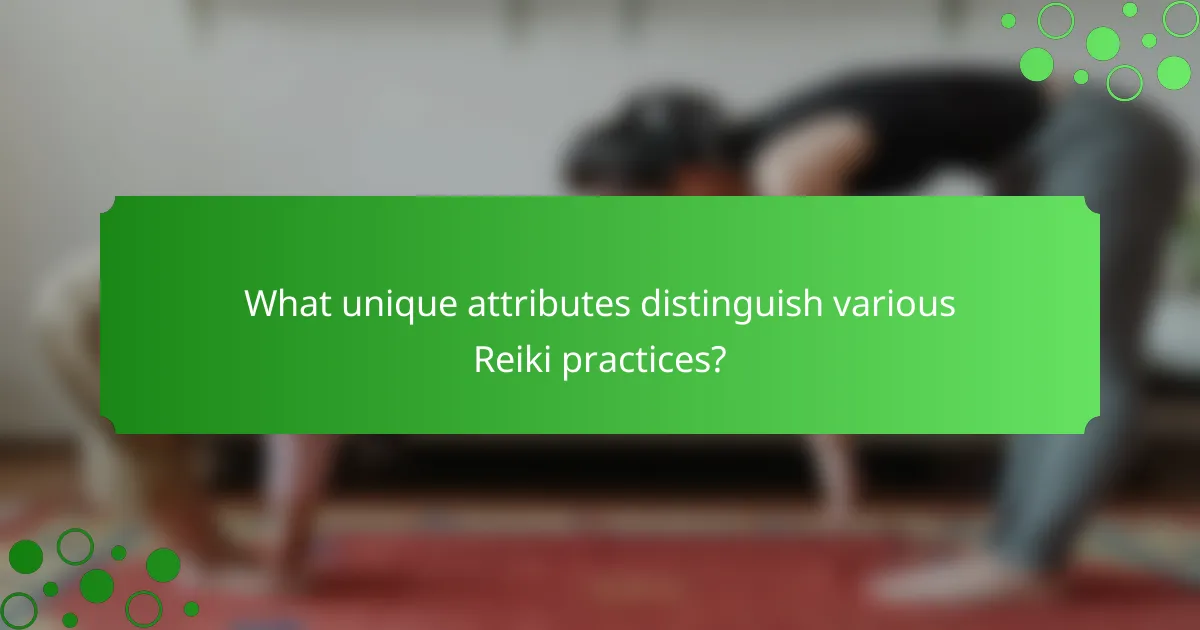
What unique attributes distinguish various Reiki practices?
Various Reiki practices are distinguished by unique attributes such as techniques, symbols, and focus areas. For instance, Usui Reiki emphasizes traditional hand positions, while Karuna Reiki incorporates specific symbols for healing. Additionally, some practices like Kundalini Reiki focus on energy awakening, differing from the stress-reduction focus of others. Each style offers distinct approaches to energy balance, appealing to diverse preferences and needs.
How do different Reiki schools and traditions vary in approach?
Different Reiki schools and traditions vary significantly in their techniques and philosophies. Some focus on traditional Japanese methods, emphasizing meditation and spiritual growth, while others adopt Western approaches that prioritize physical healing and energy balance.
For instance, Usui Reiki, the most widely practiced form, blends healing with spiritual development, promoting personal empowerment. Karuna Reiki, on the other hand, incorporates additional symbols and techniques aimed at healing past traumas.
Additionally, some schools emphasize specific hand placements or distance healing, while others advocate for intuitive approaches tailored to individual needs. These variations contribute to a rich tapestry of practices that cater to diverse preferences and healing goals in the realm of Reiki.
What are the unique benefits of specialized Reiki techniques, like Karuna Reiki?
Specialized Reiki techniques, like Karuna Reiki, offer unique benefits for energy balance and stress reduction. These methods enhance emotional healing, promote deep relaxation, and facilitate spiritual growth. Karuna Reiki specifically integrates compassion and forgiveness, fostering a profound sense of peace. Additionally, it can help release trauma and negative patterns, leading to lasting transformation. Overall, these specialized techniques provide a holistic approach to well-being, addressing both physical and emotional aspects of health.
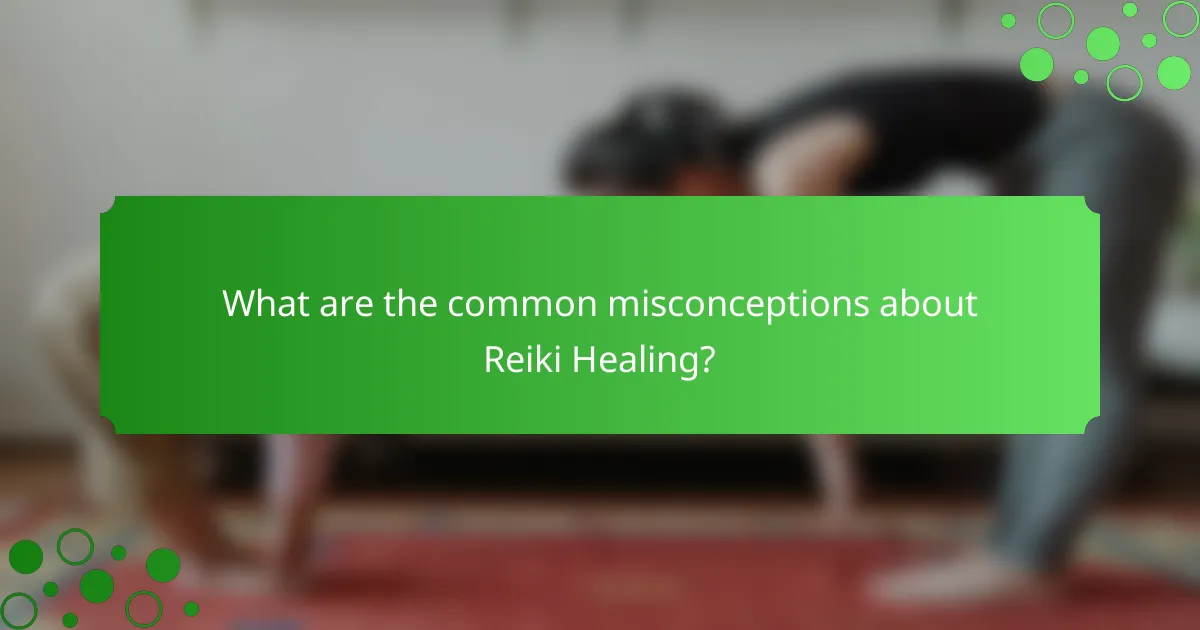
What are the common misconceptions about Reiki Healing?
Many misconceptions surround Reiki Healing, often leading to misunderstanding. One common belief is that Reiki is a religious practice, while it is actually a form of energy healing that complements various spiritual paths. Another misconception is that Reiki can replace medical treatment; it is intended to support health and well-being, not substitute for professional medical care. Some people think that only trained practitioners can receive Reiki, but anyone can benefit from it, whether through self-healing or receiving sessions from others. Additionally, there is a belief that Reiki is merely a placebo effect; however, numerous studies indicate measurable benefits such as reduced stress and improved emotional health. Finally, some assume that Reiki is only effective for physical ailments, yet it also addresses emotional and spiritual issues, enhancing overall energy balance.
Why do some people doubt the efficacy of Reiki?
Some people doubt the efficacy of Reiki due to a lack of scientific evidence supporting its claims. Critics argue that the benefits attributed to Reiki, such as stress reduction and energy balance, can often be explained by placebo effects. Additionally, skepticism arises from the absence of standardized practices and training among practitioners, leading to inconsistent experiences. As a result, individuals may question the validity of Reiki as a legitimate healing modality.
How can misconceptions about Reiki impact its acceptance in healthcare?
Misconceptions about Reiki can hinder its acceptance in healthcare by fostering skepticism among practitioners and patients. Common misunderstandings include viewing Reiki as a religious practice or dismissing it as pseudoscience. These beliefs can lead to a lack of integration into conventional medical settings, limiting access to its benefits for energy balance and stress reduction. As a result, patients may miss out on complementary therapies that support overall well-being. Addressing these misconceptions through education and research can enhance Reiki’s credibility and acceptance in the healthcare community.
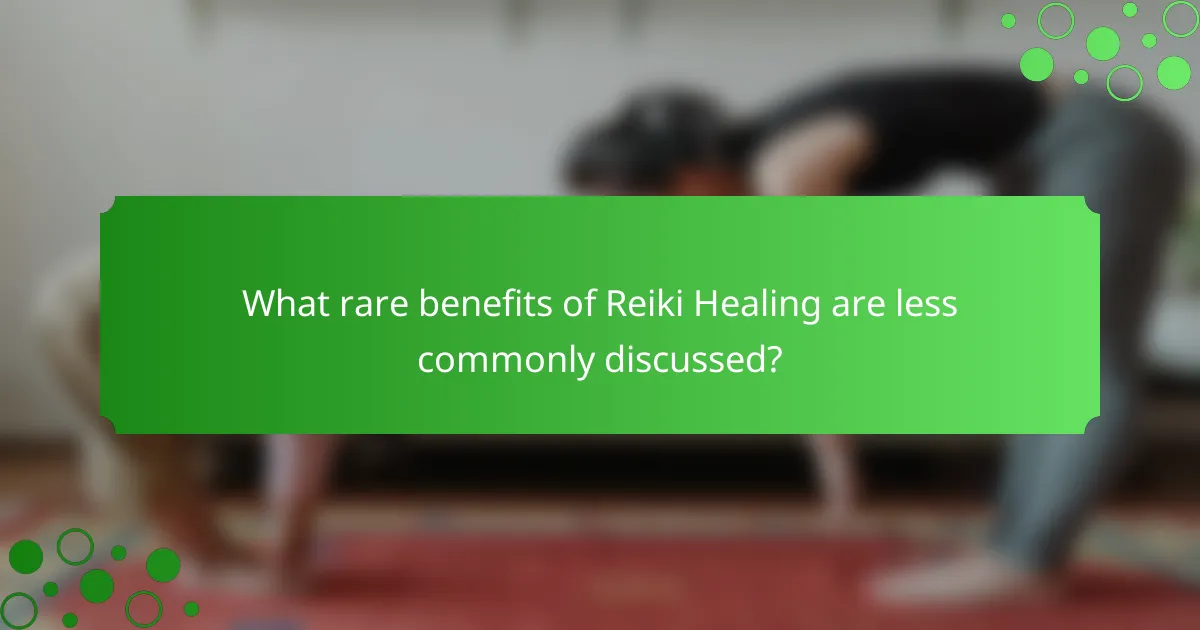
What rare benefits of Reiki Healing are less commonly discussed?
Reiki healing offers several rare benefits that are often overlooked. One such benefit is enhanced intuitive clarity, which allows individuals to tap into their inner wisdom. Another rare advantage is the facilitation of emotional release, helping to process and let go of suppressed feelings. Additionally, Reiki can promote deep states of relaxation, leading to creative breakthroughs. Some practitioners report a unique connection to universal energy that enhances spiritual growth. Finally, Reiki may support the healing of past traumas, providing a pathway for emotional and psychological healing.
How can Reiki support recovery from trauma?
Reiki can significantly support recovery from trauma by promoting energy balance and reducing stress. This holistic healing method encourages relaxation, which aids emotional healing.
Reiki works by channeling universal energy to clear blockages, fostering a sense of peace. Clients often report reduced anxiety and improved emotional clarity after sessions.
Research indicates that Reiki may enhance traditional therapies, leading to better outcomes in trauma recovery. For instance, a study found that participants experienced lower cortisol levels, indicating reduced stress.
Overall, integrating Reiki into a recovery plan can provide valuable support, enhancing overall well-being and resilience.
What are the unexpected outcomes reported by long-term Reiki practitioners?
Long-term Reiki practitioners often report unexpected emotional healing, enhanced intuition, and deeper connections with others. These outcomes extend beyond physical wellness, leading to improved mental clarity and heightened empathy. Practitioners also experience increased resilience to stress and a greater sense of purpose in life. Additionally, some report spontaneous insights and creativity, showcasing the holistic impact of Reiki on overall well-being.
What innovative applications of Reiki are emerging in modern wellness practices?
Innovative applications of Reiki in modern wellness practices include integration with mindfulness techniques and virtual sessions. Practitioners now combine Reiki with meditation, enhancing energy balance and stress reduction. Additionally, online Reiki sessions have emerged, making healing accessible regardless of location. This adaptability has expanded Reiki’s reach, allowing more individuals to experience its benefits.
What are the best practices for maximizing the benefits of Reiki Healing?
To maximize the benefits of Reiki healing, practice regularly, create a calm environment, and maintain an open mindset. Consistency in sessions enhances energy balance and stress reduction. Focus on deep breathing during sessions to promote relaxation. Stay hydrated to support energy flow. Integrate Reiki with other wellness practices for holistic benefits.